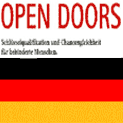 |
Germany
Project Running Time: Action 2 and 3:
until 30.06.2005
DP Managing organisation: ISL - Interessenvertretung Selbstbestimmt Leben Deutschland e.V.
DP Substract The main objectives of the DP OPEN DOORS are Rationale for the Development Partnership Website DP
Substract: EQUALity - including partners from Austria and Italy One of the national partners of "OPEN DOORS" - the Berlin Centre for self-determined living BZSL - is hosting the TSW-website The
main objectives of the DP OPEN DOORS are: Putting together and implementing
an ability-mainstreaming concept Rationale for the Development Partnership: Within the European Union people now for a number of years have had the right to choose their place of work. However, in many areas people with disabilities have been denied this right. Disabled people still face numerous barriers which are almost impossible to overcome. Looking at the basic education and training possibilities it becomes clear that in Europe even the access to the work force disproportionately is limited for disabled people. Inclusive education for disabled children and teenagers is an exception. In general schools are part of segregated and special institutions. There children and teenagers often depend on institutional help. This institutional help prepares them for a life and work in special institutions rather than teaching them skills which will help them to integrate into the regular work force and assert themselves there. The transition from school to work causes lots of problems. The problems continue and turn out to also be the central theme in all kinds of adult education areas. Existing deficits in the areas of general education and career education need to be reduced by further developing already proven and new educational methods. On the one hand mobility as well as communication barriers have to be reduced while at the same time the markets of general education, career education and the labour market have to open up. On the other hand disabled people have to be able to develop and try out key qualifications for their individual career plans as well as necessary mobility and flexibility issues.
Disabled people need individual aids which they can control themselves as well as instruments, such as "Work Assistance", and skills to use assistance effectively which will help them to integrate. Only with these aids and instruments on hand disabled people will be able to move around and away from the limiting special lives ment for them. They will be able to orient themselves and become more flexible in their working lives. From early on disabled people have to be enabled to work against hindrances (the experiences to depend on the institution, help, care taking). Disabled people also have to be enabled to try out their rights to equal opportunities and participation and to put both into practice. It is necessary that disabled people become empowered. All important people to whom a disabled person is closest (parents, teachers, helpers, career advisers, etc.) as well as the people responsible for arranging the basic conditions have to be included in this necessary empowerment process. This is important as these people may also have to change their perspectives and roles (from care takers to assistants). This way they can take an active part in the success as well as in the corresponding change / further development of the basic conditions (de-institutionalising, more flexibility). Website of the German Partnership
"OPEN DOORS - core skills and equal
opportunities for people with disabilities" By using this link you will leave the TSW-website. If you want to return, please use the "back" button in your browser-window, at the top, left
|